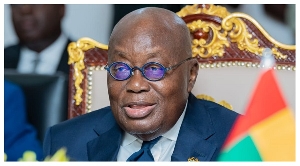- Home - News
- TWI News | TV
- Polls
- Year In Review
- News Archive
- Crime & Punishment
- Politics
- Regional
- Editorial
- Health
- Ghanaians Abroad
- Tabloid
- Africa
- Religion
- Election 2020
- Coronavirus
- News Videos | TV
- Photo Archives
- News Headlines
- Press Release
General News of Thursday, 14 July 2011
Source: GNA
IOM Ghana launches strategic plan on migration
Accra, July 14, GNA – The International Organisation for Migration (IOM) Ghana on Thursday launched a four-year Strategic Plan in Accra to prioritise its activities in line with government’s policies and improve on service delivery.
The 58-page document produced in cooperation with IOM partners would also help it to effectively undertake its mission, vision as it evaluates its performance against the strategic objectives.
The launching coincided with the year-long global 60th Anniversary celebration on the theme, “IOM at 60: Looking Back, Looking Forward: IOM’s Plan for Migration for the Benefit of All”.
Mr Kobby Acheampong, Deputy Minister of the Interior, said effective management of migration by States had acquired a significant importance globally in recent times.
He said it was therefore a great satisfaction that IOM, in coordination with its partners, set the pace for supporting the Government to develop its migration policy as well as manage the broad spectrum of the migration phenomena in a manner which could have a tangible effect on the well-being of migrants, their families and the nation as a whole.
Mr Acheampong explained that the strategic plan was the culmination of more than 20 years of programmatic interventions and research in Ghana by IOM.
He said the highlighting of migration trends in Africa, especially West Africa and Ghana in particular, and the elaboration of the programmatic strategic interventions for the 11 typologies of migration management, reflected the multi-disciplinary and international strengths of IOM as well as the way in which migration could be managed to make a positive impact on diverse areas of development.
The Deputy Minister said although Ghana was admitted as a full member of the IOM Council in 2005, the organisation had for a long time supported migration management in the country.
“It is a matter of public record that IOM is instrumental in organising the return of a significant number of Ghanaian professionals from Europe and North Africa in the late 1980’s and 1990’s through its Return of Qualified African Nationals Programme.
“IOM also has supported and continues to support the rescue, return and reintegration of many victims of trafficking in Ghana. The facilitation of resettlement to third countries and voluntary repatriation of Liberian and Sierra Leonean refugees hosted by Ghana has been a key hallmark of IOM Ghana’s operations,” he added.
Mr Acheampong commended the organisation on its 60th anniversary and expressed the hope that the collaboration between them on issues of migration management in Ghana would be much enriched with the implementation of the strategic plan, as they pursue the realisation of Ghana’s development objectives.
Ms Dyane Epstein, Chief of Mission, IOM Ghana, said the strategic plan expounds how and why IOM Ghana would plan to provide services to assist a wide range of beneficiaries during 2011-2015, within the four main areas of the organisation’s mandate, namely, migration and development, facilitating migration, regulating migration, and forced migration.
She said each focus area was marked by key strategic objectives designed to benefit IOM’s target groups and expressed the hope that its implementation would deliver several key benefits to Ghana.
Ms Epstein said IOM worldwide would have activities and initiatives throughout the year to link the anniversary year devoted to the central motto, “IOM-Migration for the Benefit of All”.
She reiterated IOM’s commitment to collaborate with the Government, private sector, UN agencies, other development partners, and civil society organisations, to ensure the management of migration in Ghana would benefit all.
Mrs Ruby Sandhu-Rojon, United Nations Resident Coordinator for Ghana, stressed the need to look at migration as a phenomenon which would stay with society.
However, she said, it should be managed such that the rights of all parties would be protected and the causes of the drama, particularly as related to illegal migration were addressed, notably through promoting development where it was needed most.
Mrs Sandhu-Rojon said migration was a process to be carefully explored and not a problem to be eliminated.
“Migration brings numerous benefits both tangible and intangible to all involved. Migrant generally gain access to higher levels of human development like opportunities for higher levels of human development, higher income, better access to education and health for themselves and their family members who could not move with them,” she added.
Mrs Sandhu-Rojon said while the debate on migration tended to focus on the negative aspects such as brain-drain, unwanted illegal migration and the human drama in both countries of origin and host nations, the remittances which migrants sent had become an important source of social safety-net and a major source of foreign exchange for many countries, including Ghana.
She noted that returning migrants meant not just the possible burden of society supporting them to re-integrate, but a reduction in remittances which had hitherto supported households and in some cases been the mainstay of local economies as was the case in some communities in the Brong Ahafo Region.
“We need to look beyond the labour issues and address migration holistically and that is where this IOM Strategic Plan comes in,” she added.
The UN Resident Coordinator described the launch as timely, when the Government was formulating a comprehensive migration and development policy for the country to provide a framework for the effective management of migration in Ghana.
She therefore urged the Government to recognise and harness the benefits of the positive side of migration for the country’s development.
Mr Chris Kpodo, Deputy Minister of Foreign Affairs and Regional Integration, said well managed migration would promote understanding, cohesion and inclusion in mixed communities.
He therefore commended IOM Ghana for reaching a special milestone in its history of assisting migrants worldwide in an ever changing political and social environment.
Mr Kpodo said since the establishment of the Ghana Office over two decades ago, IOM had partnered with the Government in diverse ways in addressing challenges faced by migrants to and from the country.
He said the launch was significant to Ghana as any effort to further facilitate and manage migration conformed to the overarching objective of Government to secure and protect the rights of the citizenry in line with the Better Ghana Agenda.
Mr Kpodo pledged government’s commitment to ensure that the strategic plan was implemented to benefit all and sundry.











